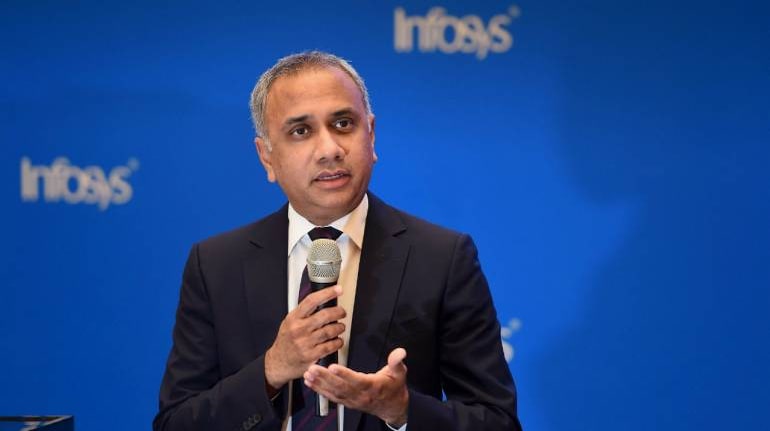



Infosys Chief Executive Officer (CEO) Salil Parekh’s FY23 compensation stood at Rs 56.44 crore, down from Rs 71 crore in the previous year, the Bengaluru-based IT services company’s annual report shows.
The fall is primarily because Parekh exercised fewer restricted stock units (RSUs) during the year. Restricted stock units is a form of equity compensation offered to employees. Infosys offers RSUs based on two plans. Under its 2015 plan, the stocks are vested largely based on time but under the 2019 plan, the benefit is based on performance. The performance indicators include total shareholder return and the company’s operating metrics.
Infosys’ cross-town rival Wipro’s CEO Thierry Delaporte drew Rs 82.4 crore during the year, a fall of 5 percent from the financial year 2021-22.
Parekh’s remuneration comprises fixed pay, variable pay, retiral benefits and the perquisite value of stock incentives exercised during the period. Infosys said that Parekh’s remuneration dropped 21 percent from the previous year.
How it stacks up
Of the Rs 56.44 crore compensation, Infosys said Parekh earned Rs 30.6 crore by exercising his RSUs. Last fiscal, Parekh earned Rs 52.33 crore by exercising his RSUs, making him one of India’s highest-paid CEOs.
In FY23 fiscal, Parekh earned Rs 6.67 crore in base pay, Rs 45 lakh as retiral benefits and Rs 18.73 crore was his variable pay or bonus for the year. His variable pay went up from Rs 12.62 crore in 2022 to Rs 18.73 crore in 2023.
Parekh made 627 times the median remuneration —Rs 9 lakh — of the company’s employees. While the gap was narrower from the previous year but it came in a year characterised by fresher onboarding delays, variable pay cuts and more as the industry faced increased uncertainty.
Parekh, however, wasn’t the highest paid at Infosys. It was president Mohit Joshi, who resigned in March after being named Tech Mahindra CEO. Joshi earned Rs 57.32 crore in FY23. He leaves Infosys on June 9.
In his letter to shareholders, Parekh said FY23 was a strong year for the company’s business, with a growth of over 15 percent and operating margins at $2.5 billion.
“Last year we returned US$3.1 billion to our shareholders – US$1.7 billion as dividend and US$1.4 billion through our share buyback program. At the end of the financial year, we were the leading company among our peers in total shareholder return over the past five years,” he said.
Parekh added that in the last few quarters, the global economy had been dealing with inflation, interest rate increases, and changes in demand environment for companies in various industries.
“Our strength in digital, cloud, and in automation, along with cost efficiency capabilities have held us in good stead. These will continue to be critical in the evolving economic environment,” he said.
Disruptions ahead
Infosys chairman Nandan Nilekani did not draw any remuneration for the year.
In his letter to shareholders, co-founder Nilekani wrote that the one overriding theme defining the world was that was “suffused with uncertainty”.
“The placid and the predictable are behind us as each new day brings new inputs and new events that derail the carefully-crafted models we have constructed of the world around us.
“The cocktail of inflation, interest rates, geopolitics, war, demand volatility, supply chain dislocations, the shift from efficiency to resilience and security, all stirring quickly and without warning, is what’s before us. In any week, we may oscillate from caution to optimism and back to caution based on the news of the day.” Nilekani said.
These times required companies to be efficient as well as flexible, he added.
Discover the latest Business News, Sensex, and Nifty updates. Obtain Personal Finance insights, tax queries, and expert opinions on Moneycontrol or download the Moneycontrol App to stay updated!
Find the best of Al News in one place, specially curated for you every weekend.
Stay on top of the latest tech trends and biggest startup news.